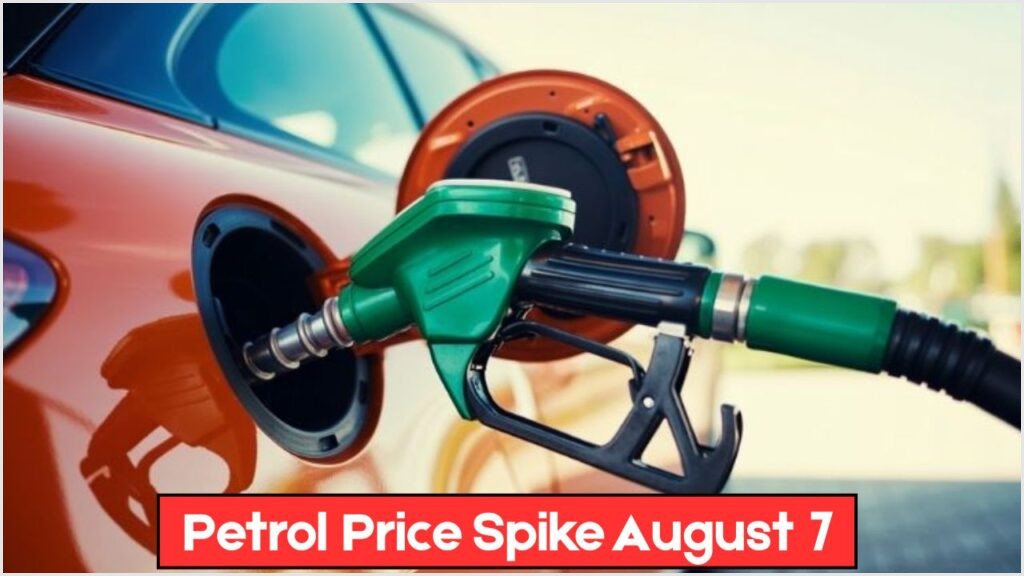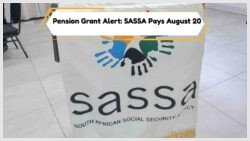Petrol Price Hike – South African motorists are set to face another fuel price shock as the Department of Mineral Resources and Energy (DMRE) has officially confirmed a steep hike in petrol prices effective from midnight on August 7, 2025. The nationwide increase of R1.85 per litre will impact millions, from daily commuters to logistics providers, triggering a domino effect on transportation and basic goods. This substantial rise in fuel cost is attributed to several critical factors, including the weakening Rand, soaring international oil prices, and changes in global demand patterns. The DMRE’s latest announcement has sparked widespread concern, as it comes at a time when households are already grappling with high inflation, food insecurity, and economic instability. With the cost of living continuing to rise, this petrol hike will likely squeeze family budgets even further. Economists warn that transport-related price hikes could cascade into sectors like food distribution, logistics, and essential services, directly affecting the consumer. This price adjustment will be implemented across all fuel stations in South Africa, but the final pump price will vary city by city depending on transportation and operational costs. Whether you’re in Cape Town, Johannesburg, Durban, or a smaller town, understanding what to expect on August 7 is essential. Let’s break down the petrol price increase, city-specific rates, contributing factors, and what motorists and consumers can do to manage the impact.
National Petrol Price Increase – What’s Changing from August 7?
The Department of Mineral Resources and Energy (DMRE) has issued the latest update reflecting significant changes in fuel pricing starting August 7, 2025.
 Discover the Fastest Way to Unlock NSFAS Funds: Thousands Swear by This Proven Appeal Format!
Discover the Fastest Way to Unlock NSFAS Funds: Thousands Swear by This Proven Appeal Format!
- Petrol 93 Octane: Increase of R1.85 per litre
- Petrol 95 Octane: Increase of R1.85 per litre
- Diesel 0.05%: Increase of R1.12 per litre
- Diesel 0.005%: Increase of R1.09 per litre
- Illuminating Paraffin: Increase of R0.65 per litre
- LPGas: Increase of R1.20 per kilogram
This nationwide increase affects every motorist and will likely influence public transport fares and the delivery costs of goods and services.
City-Wise Petrol Price Breakdown – Check Your Province’s Rate
Different provinces will experience slightly different pump prices depending on logistical and distribution costs. Here’s how the adjusted prices will reflect across major regions:
 August 17, 2025: R1,250 Foster Child Grant Payout Begins – Ensure You Receive Your SMS Alert!
August 17, 2025: R1,250 Foster Child Grant Payout Begins – Ensure You Receive Your SMS Alert!
Petrol Price per Litre by City (93 Octane)
| City | Current Price | Increase | New Price (Aug 7) |
|---|---|---|---|
| Johannesburg | R23.11 | R1.85 | R24.96 |
| Cape Town | R23.48 | R1.85 | R25.33 |
| Durban | R23.20 | R1.85 | R25.05 |
| Bloemfontein | R23.30 | R1.85 | R25.15 |
| East London | R23.70 | R1.85 | R25.55 |
| Port Elizabeth | R23.65 | R1.85 | R25.50 |
| Polokwane | R22.95 | R1.85 | R24.80 |
| Nelspruit | R23.10 | R1.85 | R24.95 |
Why Is the Petrol Price Increasing Again?
There are multiple contributing factors to this month’s steep petrol hike, many of which are driven by global market shifts and internal economic pressure.
Key Reasons Behind the Price Surge
- Global Brent crude oil price rose above $87 per barrel in July.
- Rand weakened against the US Dollar, now trading at R18.80/USD.
- Refined petrol cost has increased in international markets.
- Import and freight costs have surged due to Middle Eastern tensions.
- The slate levy adjustment added further pressure.
- Local taxes and distribution margins remain unchanged but add to overall cost.
Impact on Households and Public Transport Users
The ripple effect of the August fuel hike will extend far beyond vehicle owners. Here’s how it could impact everyday South Africans.
Hike’s Immediate Impact
- Increase in taxi and bus fares by an estimated 8-12%.
- Grocery and food prices may rise in the coming weeks due to transport costs.
- Higher electricity costs for users relying on generators.
- Reduced disposable income for low and middle-income families.
- Inflation rate may surge past 6% mark again, affecting lending rates.
How to Cut Down Fuel Costs After This Hike?
Consumers and motorists can take certain steps to soften the impact of the August petrol price increase. Adopting smarter fuel consumption practices can go a long way.
Smart Strategies to Manage Rising Fuel Prices
- Use lift clubs and share commutes with co-workers.
- Switch to public transport where feasible.
- Drive economically – avoid harsh acceleration and over-speeding.
- Keep your vehicle well-maintained for optimal fuel usage.
- Plan errands smartly – combine trips to reduce travel.
- Use apps that compare fuel prices in your area.
- Avoid peak traffic times to save fuel during idle running.
What to Expect in the Coming Months?
Many analysts are predicting continued volatility in fuel prices due to global uncertainties and currency fluctuations.
Economic Outlook and Predictions
- Petrol prices may rise further in September if Brent crude crosses $90/barrel.
- The Rand is expected to remain weak in the short term.
- A possible interest rate hike could be on the table in Q4 2025.
- The government may consider reviewing fuel levies in late 2025.
Departmental Contact Information
For official updates or complaints regarding fuel prices or availability, contact the Department of Mineral Resources and Energy.
Department of Mineral Resources and Energy (DMRE)
Website: www.energy.gov.za
Fuel Price Enquiries: 012 406 8000
Email: info@energy.gov.za
Consumer Hotline: 0860 103 089
Operating Hours: Mon-Fri, 8:00 AM – 4:30 PM
FAQs
Q1: When will the new petrol prices take effect?
A1: The revised prices will come into effect at midnight on August 7, 2025.
Q2: How much is the petrol price hike?
A2: Petrol will increase by R1.85 per litre nationwide, though the final price varies by city.
Q3: Why is petrol becoming so expensive?
A3: The increase is due to a rise in global oil prices, a weak Rand, and international shipping costs.
Q4: Will diesel and LPG prices also increase?
A4: Yes, diesel will go up by over R1.09 per litre, and LPG will increase by R1.20/kg.
Q5: Can the government reduce fuel levies to ease the burden?
A5: While discussions are ongoing, no official reduction in fuel levies has been announced yet.
How can individuals prepare for the upcoming petrol price hike on August 7?
By budgeting for increased fuel expenses and adjusting transportation plans accordingly.




